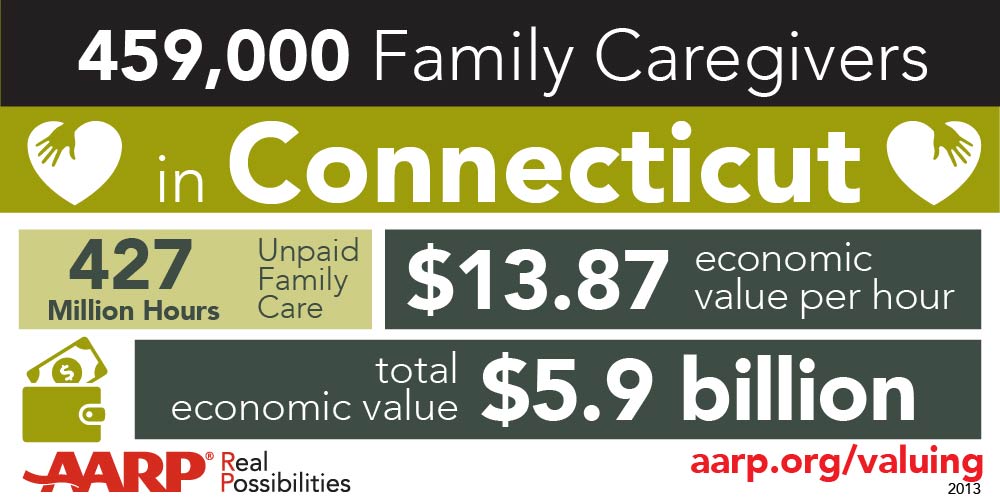AARP Eye Center

Family caregivers in Connecticut provided 427 million hours of care—worth an estimated $5.93 billion—to their parents, spouses, partners, and other adult loved ones in 2013, according to AARP Public Policy Institute’s new report, Valuing the Invaluable: 2015 Update. The total estimated economic value of uncompensated care provided by the nation’s family caregivers surpassed total Medicaid spending ($449 billion), and nearly equaled the annual sales ($469 billion) of the four largest U.S. tech companies combined (Apple, Hewlett Packard, IBM, and Microsoft) in 2013.
Family caregiving for relatives or close friends with chronic, disabling, or serious health problems so they can remain in their home is nearly universal today. In 2013, about 459,000 family caregivers in Connecticut helped another adult loved one carry out daily activities (such as bathing or dressing, preparing meals, administering medications, driving to doctor visits, and paying bills).
“This new report underscores the need to do more to assist family caregivers in Connecticut,” said AARP Connecticut State Director Nora Duncan. “Connecticut’s passage of the CARE Act this year was a tremendous victory but there are additional steps we can take to help family caregivers that include improved workplace flexibility, tax credits and restoring funding for respite care and home care services.”
Family Caregivers in the Future
As Americans live longer and have fewer children, fewer family members will be available for older adults to rely on for everyday help in the future. The ratio of potential family caregivers to the growing number of older people has already begun a steep decline. In 2010, there were 7.2 potential family caregivers for every person age 80 and older. By 2030, that ratio will fall sharply to 4 to 1, and is projected to drop further to 3 to 1 in 2050.
Impact of Caregiving on Jobs, Money, and Health
Family caregivers report that the stress of caregiving affects their physical and emotional health, finances, and their jobs.
- More than half (55%) of family caregivers report being overwhelmed by the amount of care their family member needs.
- Nearly 4 in 10 (38%) family caregivers report a moderate (20%) to high degree (18%) of financial strain as a result of providing care.
- In 2014, the majority (60%) of family caregivers had full- or part-time jobs.
Strategies and Policies Needed to Help Caregivers
AARP strongly supported passage of the CARE Act (Public Act 15-32) and efforts to implement Paid Family Medical Leave insurance (S.B. 1502, Sec. 422) in Connecticut in 2015. Duncan added, “We also need to work on a broader plan that involves both the public and private sectors to support family caregivers here in Connecticut.”
“Valuing the Invaluable: 2015 Update” Methodology
The estimates in this report by AARP’s Public Policy Institute are based on a meta-analysis of 11 U.S.-based surveys of family caregivers conducted between 2009 and 2014. Estimates are based on about 40 million caregivers providing an average of 18 hours of care per week to a parent, spouse/partner, or other adult loved one, at an average value of $12.51 per hour. ‘Caregiver’ is defined as an adult age 18 and older providing care to a parent, spouse, or other adult loved one with their daily activities such as bathing or dress, preparing meals, and/or managing their finances, currently or within the last month.
Caregiving Resources:
- AARP Caregiving Resource Center
- Caregiving in the US: 2015 Report
- Home Alone: Family Caregivers Providing Complex Chronic Care (October 2012)
- The ABA/AARP Checklist for Family Caregivers: A Guide to Making It Manageable (2015)
- Amy Goyer’s ABA/AARP Juggling Life, Work and Caregiving (2015)
- AARP’s I Heart Caregivers Initiative























































